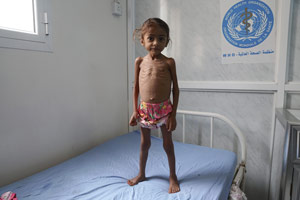The Situation in Yemen Is Dire
Published on March, 44 2019Above: Ibtissam, a 15-year-old orphan girl, lives in a ragged tent with her 7 siblings in an IDP settlement in Khamir, about 100 km north of Yemen’s capital. Ibtissam’s father was killed when her hometown of Saada was attacked in 2015 and her mother died of a stroke shortly after. Ibtissam and her siblings were evacuated by an uncle and aunt. They are among the more than 3 million people who have fled their homes in search for safety and security since the escalation of the conflict in 2015. Photo: Giles Clarke/UN OCHA, 2017. Used by permission of the photographer.
By Ellen Rosser
For the Middle East Committee
The situation in Yemen is still tense. The conflict began in 2014 when the Houthis moved from their center in Saada and took over much of the country, including the capital of Sanaa, where they overthrew the government of President Hadi and drove him out.
The fighting escalated in 2015 when Saudi Arabia and the UAE formed a coalition fighting to restore the Hadi Government. The US provided logistical support, including refueling fighter planes, and the coalition has carried out more than 18,000 raids on Houthi-held areas. Though the US issued a statement in November 2018 saying it halted refueling assistance, it has also provided intelligence support and supplied weaponry to the coalition.
 Photo: Kholod, 3 years old, stands on a hospital bed at Al Thawra Hospital in Al Hudaydah, Yemen, in April 2017, shortly after being admitted to the pediatric ward for severe acute malnutrition. One of five children, her father is a teacher in a local school but he had not been paid in months. According to UN figures, nearly 2.2 million Yemeni children are acutely malnourished and an estimated 462,000 children suffer from severe acute malnutrition in Yemen today, a nearly 200% increase since 2014. Giles Clarke/UN OCHA.
Photo: Kholod, 3 years old, stands on a hospital bed at Al Thawra Hospital in Al Hudaydah, Yemen, in April 2017, shortly after being admitted to the pediatric ward for severe acute malnutrition. One of five children, her father is a teacher in a local school but he had not been paid in months. According to UN figures, nearly 2.2 million Yemeni children are acutely malnourished and an estimated 462,000 children suffer from severe acute malnutrition in Yemen today, a nearly 200% increase since 2014. Giles Clarke/UN OCHA.
Yemen is suffering a massive humanitarian disaster because of the fighting, with 85,000 children dying of starvation and many more civilians dying from cholera and starvation. Recently a peace conference in Sweden obtained an agreement from the warring parties to open the crucial port of Hodeida through which most humanitarian aid comes, and a UN peacekeeping mission is monitoring the implementation of the ceasefire that stopped the fighting there. However, clashes still have been reported and neither the Houthi militia nor the government forces have deployed from the city yet.
The US position on the war in Yemen is unclear and in flux. Following Saudi Prince Mohammed bin Salman’s murder of the journalist Jamal Khashoggi (October 2018), the US Senate voted in December to end the US role supporting Saudi Arabia in Yemen, even though Trump has not indicated that he supports ending the US role there.
However, when the new Democratic-majority House passed the same resolution and sent it to the Senate in January, the Republican-controlled Senate refused to consider it, citing the government shutdown as the reason at that point.
The new Congress has taken this issue up immediately (see Congress Poised to Move Forward with Bold Agenda on Yemen) and the House passed a bill invoking its War Powers ability to end the US involvement in Yemen. But yet another GOP maneuver is blocking the bill from getting a Senate vote. Even if the Senate were to pass a similar bill, Trump may veto it. That could cause a constitutional crisis, since only Congress has the right to declare war.
Please call your Senators and ask them to immediately halt all US military support for the war and all sales of weapons or nuclear technology to Saudi Arabia. Telephone switchboard for Senate: 1-202-224-3121.



